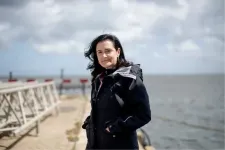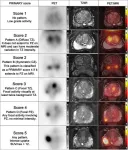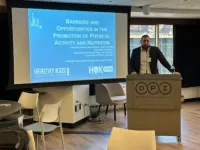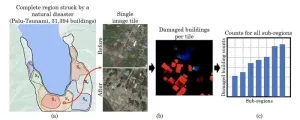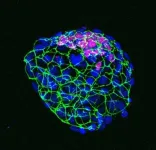(Press-News.org) Professor dr. Linda Amaral-Zettler, Research Leader at NIOZ Royal Netherlands Institute of Sea Research and the Chair in Marine Microbiology at the University of Amsterdam has been awarded a prestigious Advanced ERC-grant by the European Commission today. Amaral-Zettler receives almost 3,5 million euros for her research into biodegradation in the marine environment. “Biodegradable sounds really nice”, she admits. “But before we repeat the mistakes we’ve made with fossil-fuel-based plastics back in the last millenium, we really want to understand how these materials interact with marine life and how long they last in the environment.” “Biodegradable sounds really nice”, she admits. “But before we repeat the mistakes we’ve made with fossil-fuel-based plastics back in the last millenium, we really want to understand how these materials interact with marine life and how long they last in the environment.”
Vibrant sea
For the next five years, Amaral-Zettler, together with three PhD-candidates and lab analysts, will work on the project she creatively calls ‘ViBRANT-SEA’, the acronym for her project entitled: Validating Biodegradation Rates and Reactions Applying Novel Technologies and Systems Ecology Approaches. “Above all, with this project we want to emphasize how vibrant the marine ecosystem still is and how we should keep it that way.”
Who biodegrades the biodegradables?
The project is divided in three so-called work-packages. “In the first, we want to identify who is breaking down the biodegradables. We will look for novel microbes, but also for specific genes in these microbes, that encode the enzymes that are necessary for biodegradation of the main components of two biodegradable polymers we will concentrate on: polyhydroxyalkanoates and polylactic acid. In the meantime, we may also find pathways that produce these polymers, because many microbes that break down biodegradable plastics, are also able to produce them”, Amaral-Zettler explains.
How fast do they break down?
In a second work-package, Amaral-Zettler and her team hope to find out how fast – or how slow – the biodegradable plastics break down into carbon dioxide, water and biomass. “We will establish that both in the lab, as well as under field conditions, using plastic with labeled carbon. Biodegradation under the high pressures and low temperatures of the deep sea, may be something entirely different than under conditions on land. And unfortunately, much of our plastics end up in the deep sea.”
Without lab animals
In a third work-package, Amaral-Zettler intends to collaborate with Bart Spee, expert at so-called organoids at Utrecht University, to design an organoid, or an artificial organ of a marine fish in a petri dish. “At the moment, the mandatory testing of ecotoxicity of new plastic materials is only ‘optional’ in fish, because the testing in these animals is complex and considered ethically problematic. However, fish are very important potential victims of the plastics that end up in the sea. Therefore, we hope to come up with an alternative, animal-free method to test this toxicity. We hope to test the toxicity of both conventional and biodegradable plastics, as well as their additives, such as colorants or PFAS that are added to these materials.”
Avoid the trap
Amaral-Zettler is very grateful to the European Commission for the opportunities that this ERC-grant provides. “To date, biodegradable plastics represent a small fraction of the total amount of plastics we produce, but this is increasing each year. And we really want to avoid stepping into the same trap as we did back in the fifties, when we thought plastic was a ‘nice and durable’ material that could do no harm. This ERC-grant gives us the opportunity to predict the lifetimes and impacts of biodegradable plastics, a step towards understanding how these new plastics behave in the marine environment. I hope the results of this project help manufacturers produce more environmentally friendly products, help legislators draft policies based on science, and consumers make intelligent choices when shopping. That’s what we need to maintain our vibrant seas!”
END
Prestigious European grant for research into biodegradable plastics
2024-04-12
ELSE PRESS RELEASES FROM THIS DATE:
New study finds potential targets at chromosome ends for degenerative disease prevention
2024-04-11
We depend on our cells being able to divide and multiply, whether it’s to replace sunburnt skin or replenish our blood supply and recover from injury. Chromosomes, which carry all of our genetic instructions, must be copied in a complete way during cell division. Telomeres, which cap the ends of chromosomes, play a critical role in this cell-renewal process—with a direct bearing on health and disease.
The enzyme telomerase plays a key role in maintaining the length of telomeres as chromosomes replicate during ...
Scientists discover first nitrogen-fixing organelle
2024-04-11
Modern biology textbooks assert that only bacteria can take nitrogen from the atmosphere and convert it into a form that is usable for life. Plants that fix nitrogen, such as legumes, do so by harboring symbiotic bacteria in root nodules. But a recent discovery upends that rule.
In two recent papers, an international team of scientists describe the first known nitrogen-fixing organelle within a eukaryotic cell. The organelle is the fourth example in history of primary endosymbiosis — the process by which a prokaryotic cell is engulfed by a eukaryotic cell and evolves beyond symbiosis into an organelle.
“It’s very rare that organelles ...
PET/MRI accurately classifies prostate cancer patients, offers potential to avoid unnecessary biopsies
2024-04-11
Reston, VA—PET/MRI can improve diagnostic accuracy for prostate cancer patients and help avoid unnecessary biopsies, according to new research published in the April issue of The Journal of Nuclear Medicine. By applying the PRIMARY scoring system to PET/MRI results, researchers found that more than 80 percent of unnecessary biopsies could be avoided at the expense of missing one in eight clinically significant prostate cancer cases.
The Prostate Imaging Reporting and Data System (PI-RADS) is a five-point ...
Researchers test new behavioral health interventions
2024-04-11
The concept of “One Health” – which emphasizes the relationship between human, animal, plant and environmental health – has been gaining ground in scientific discussions in recent years. Brazilian and North American researchers developing research using this approach presented their work on Tuesday (April 9th), in Chicago (United States), during FAPESP Week Illinois.
One of the panelists was Eduardo Esteban Bustamante, a professor at the University of Illinois in Chicago. He talked about behavioral interventions that have been tested to promote physical activity and healthy eating – practices that, according to the researcher, ...
New computer vision tool wins prize for social impact
2024-04-11
AMHERST, Mass. – A team of computer scientists at the University of Massachusetts Amherst working on two different problems—how to quickly detect damaged buildings in crisis zones and how to accurately estimate the size of bird flocks—recently announced an AI framework that can do both. The framework, called DISCount, blends the speed and massive data-crunching power of artificial intelligence with the reliability of human analysis to quickly deliver reliable estimates that can quickly pinpoint and count specific features from very large collections ...
The Society of Gynecologic Oncology (SGO) and The GOG Foundation, Inc. (GOG-F) launch BRIDGES 2.0 Research Initiative with support from the Foundation for Women’s Cancer (FWC).
2024-04-11
PRESS RELEASE
Chicago, IL and Philadelphia, PA, USA, April 11, 2024: The Society of Gynecologic Oncology (SGO) and The GOG Foundation, Inc. (GOG-F) Launch BRIDGES 2.0 Research Initiative with support from the Foundation for Women’s Cancer (FWC). After a successful inaugural year, the SGO and the GOG-F join forces to collaborate, and proudly announce the launch of an expanded two-year clinical trial education program supported by the FWC. This important career and clinical trial development initiative aims to cultivate the next generation of investigators in gynecologic oncology and will focus on clinical and translational research ...
Embryos in hungry mouse mums postpone development
2024-04-11
It’s challenging to sustain a pregnancy when food is short, or conditions are otherwise tough. That’s why many mammalian embryos can postpone their growth to get through periods of environmental stress and then re-enter development when conditions improve. This stalling of development is known as embryonic diapause, and understanding the mechanisms behind it might help improve infertility treatments, such as embryo freezing. Now, researchers at the Center for Excellence in Brain Science and Intelligence Technology, the Chinese Academy of Sciences in Shanghai, China, have discovered how nutrient depletion is sensed by embryos growing in hungry mouse mums to induce diapause. ...
Scripps Research study reveals new approach for combatting “resting” bacteria
2024-04-11
LA JOLLA, CA—Most disease-causing bacteria are known for their speed: In mere minutes, they can double their population, quickly making a person sick. But just as dangerous as this rapid growth can be a bacterium’s resting state, which helps the pathogen evade antibiotics and contributes to severe chronic infections in the lungs and blood, within wounds, and on the surfaces of medical devices.
Now, Scripps Research scientists have discovered how long chains of molecules called polyphosphates (polyP) are needed for bacteria to slow down movements within cells and let them enter this resting ...
UT Health San Antonio appoints Anthony Francis as associate vice president for innovation and development
2024-04-11
SAN ANTONIO, April 10, 2024 – The University of Texas Health Science Center at San Antonio (UT Health San Antonio) has appointed Anthony Francis, a renowned leader in translating research to market opportunity, as associate vice president for innovation and development in the Office of the Vice President for Research.
He joins the institution from the University of California San Francisco, where he was executive director of the Office of Technology Management and Advancement. Francis is credited with transforming ...
Study finds increased anxiety and PTSD among people who remained in Ukraine
2024-04-11
Researchers from the International Blast Injury Research Network at the University of Southampton conducted a survey to understand how the mental health of displaced Ukrainians has been affected by the ongoing war. Their findings, published in PLOS Global Public Health, describe high levels of post-traumatic stress disorder (PTSD) and generalized anxiety among both refugees and people displaced within Ukraine.
Since the Russian invasion of Ukraine began in February 2022, at least 13 million people have been displaced from their homes. Both exposure ...
